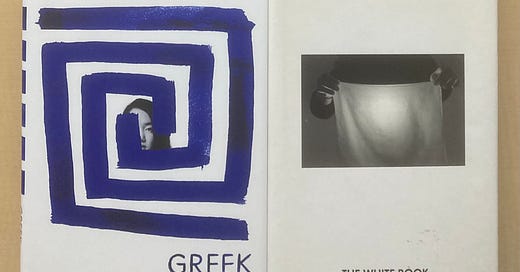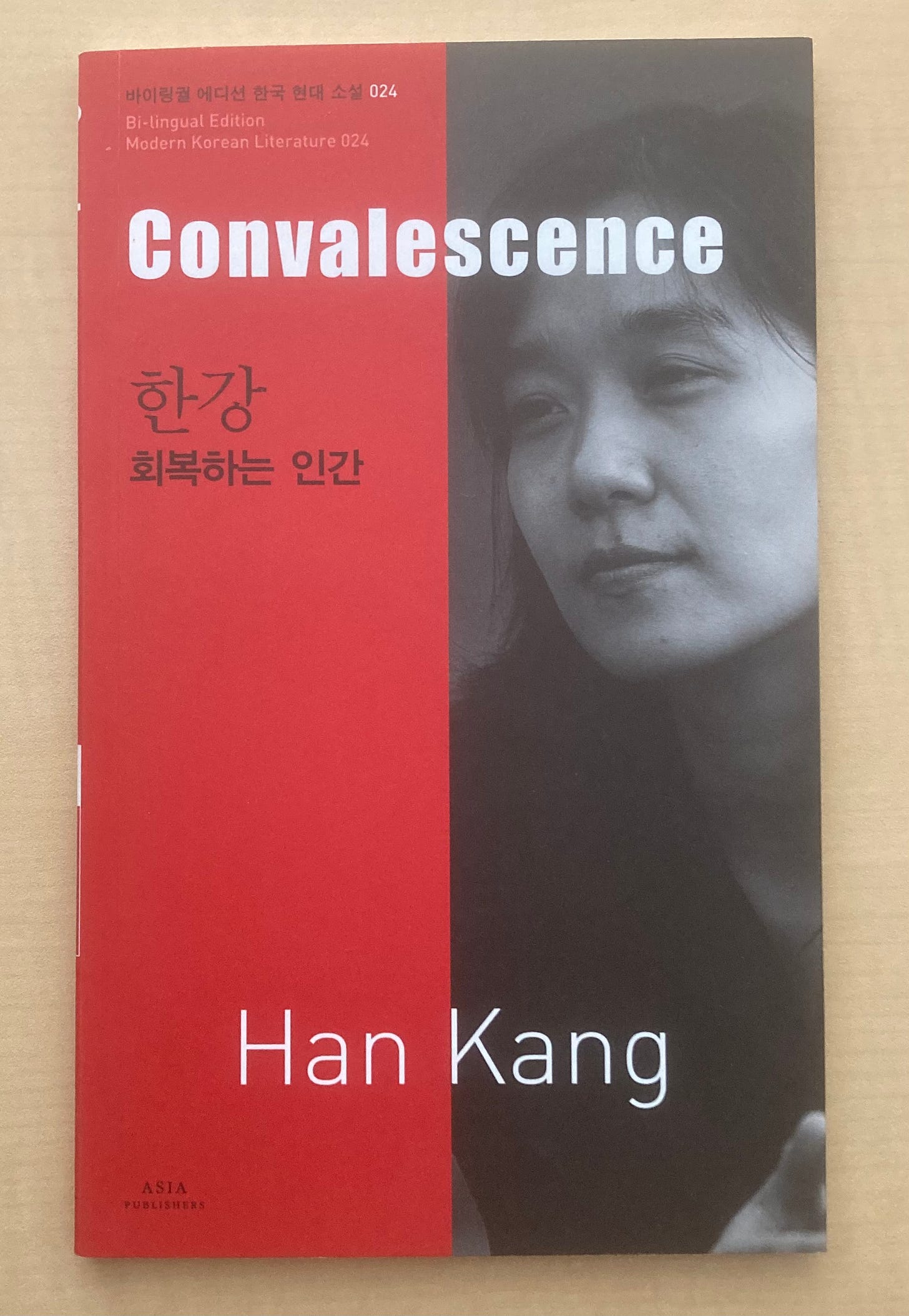Congratulations to Han Kang. I’m delighted that she has won the Nobel. I’ve been a Han Kang fan since The Vegetarian came out in English in 2015. I bought my wife the Japanese translation when it came out; she loves it too.
I also love her response, which has been in keeping with her art: refusing to celebrate while people are dying in two wars, telling her father “the Swedish Academy didn’t give me this award for us to enjoy, but to stay more clear-headed.” As LitHub says, she certainly walks the walk, and fair play to her for that.
As I said, I’ve been a fan since The Vegetarian came out in 2015 in Deborah Smith’s translation (for an interesting look at that translation, check out Leanne Ogasawara’s essay on it here). Ever the completist, I even tracked down the short story Convalescence published in a bilingual edition in 2013, translated by Jeon Seung-hee. But Han Kang being all over the news recently brought back a memory that I’d almost forgotten.
In 2016 I made my first and, sadly, to date, only appearance at the Edinburgh International Book Festival, at that time pretty much the biggest book festival in the world. The EIBF likes to pair writers together for events, partly to make for interesting juxtapositions leading to good conversations, but also because for “smaller” writers, we can pool audiences and hopefully build. The bigger names can sell tickets by themselves so they do solo events, though the EIBF still tends to pick unusual names to host. Anyway, in 2016 I was promoting The Waves Burn Bright, and we (the publisher and I) received an email from the EIBF concerning my event. Since my book was fiction built around a real-world event (Piper Alpha) and trauma, they had decided to pair me with Han Kang, whose work also tackles recent painful history (state violence, the memory of war, for example) through the prism of fiction. Made sense. I could see their thinking. It wasn’t the most obvious pairing but then that’s what they do, and they’re very good at it.
It was 2016, The Vegetarian had been a hit the year before and Human Acts (also translated by Deborah Smith) would be out in time for the festival. I was over the moon. I was going to be sharing a stage with a writer I admired hugely. I’d have been in the audience for that event anyway but instead I was getting the best seat in the house. Plus it meant I’d get to meet her, chat before or after (I’m trying not to use the phrase “hang with Han Kang”). Finally, from a ticket sales point of view, this was unbelievable. She was a bestseller, the tent would be packed, and some of her fans might even buy my book too. It was win, win, win.
At least for me.
A day or two later another email arrived: Han Kang can’t make it to the festival after all. We’ll pair you with Glenn Patterson, whose novel Gull, is about the true story of the DeLorean (the car from Back to the Future) factory in Belfast.
No offence to Glenn, who is a very nice man, a much more successful writer than me, who wrote a good book, and with whom I did a good event, but I was gutted. Still, I was getting to be in the EIBF and that was a dream come true, so I shook it off.
A few weeks later, the official programme came out and Han Kang was in it, by herself. Obviously someone—her publishers most likely—had objected to her sharing a stage.
Which is fair enough, of course, but ouch.
Sharing a stage with a future Nobel laureate, that would have been a nice boast.
I hope this doesn’t come across as bitter, it’s not meant to. I had pretty much forgotten about it and when I remembered, I laughed. I don’t have many anecdotes that connect me with a Nobel laureate. I once briefly met Seamus Heaney and have a signed copy of Opened Ground. That’s about it. Still, imagine how much better this story would have been if the event had gone ahead.
So again, congratulations to Han Kang, it’s well deserved, and if you ever feel like sharing a stage some time, I’m still up for it.
Postscript: As I was re-reading this just before posting, I suddenly remembered that I have met another Nobel laureate: John Hume who, along with David Trimble, won the Nobel Peace Prize in 1998 for his involvement with the Good Friday Agreement. In about 2001 or 2002 I was in Dublin. I was supposedly doing research for my graduate dissertation on Joyce’s Ulysses, which partly involved reading a bunch of stuff in the Trinity library and the Joyce Centre, but mostly involved drinking Guinness and buying bootleg CDs in the market and shops around Temple Bar. Anyway while I was there my father and step-mother came over for a weekend break. They were staying in a big city centre hotel (I was in a backpackers hostel) and on the Saturday we met for a drink in the hotel bar. At one point I went up to get my round in and while I was waiting had a short chat with the guy standing next to me. I get back to the table to be informed in slightly shocked tones that I’ve just been chatting with John Hume. What did we talk about? Nothing special. Weather. The prices in the hotel bar. Enjoy your night. No, no inside gossip about the peace process. Of course, I knew who John Hume was but I literally couldn’t pick him out in a crowd. He was just another guy in a suit standing at the bar waiting for his drinks. At the time I kind of wished I’d realised it was him and said something, shook his hand, but in retrospect I’m glad I didn’t. I can over fanboy at times and some of my anecdotes about meeting people whose work I respect end “… and then the atmosphere got a bit awkward so I left.” Not this time.






Sorry you didn't get to appear onstage with Han Kang, but it's a great anecdote all the same!
Some fascinating anecdotes! Thanks for sharing 😊